Unit6Topic 3(B)
Unit 6 Topic 3 Section AB 同步课时练习 仁爱版英语七年级下册

Unit 6 Topic 3Section A 短语熟记1. near here在附近2. go/ walk up ... 沿着……(向上)走go/ walk down 沿着……(向下)走go/ walk along 沿着……走3. to the end到尽头at the end of ... 在……的尽头in the end 最后;终于4. on the left在左边on your left 在你左边= on the left of you along on the left 在左前方twenty meters along on the left左前方20米5. on the right 在右边on your right 在你右边= on the right of you 6. get to sw. 到达某地= arrive in/ at … = reachget home/ here/ there 到家/到这儿/到那儿7. turn right 向右转= turn to the rightturn left 向左转= turn to the left8. at the first crossing 在第一个十字路口9. the way to...去某地的路10. go across ... = cross ... 横穿过(the road/ bridge公路/桥)11. across from在……的对面12. on the corner of ... 在……拐角处on Zhongshan Road 在中山路13. between ... and ... 在……之间Ⅰ. 词汇。
A. 根据汉语提示完成词汇。
1. Walk ________(沿着) Xinhua Road to the end.2. Go ________(横过) the ________(桥).3. Go along this road, ________(转弯) right at the second ________(十字路口).4. It is about 100 ________(米) along on the right.5. Our school is ________(在……之间) the post office and Xinhua Bookstore.B. 用所给词汇的适当形式填空。
仁爱版英语八年级Unit6_Topic3_Section_B教学设计与反思

Step5 Drill
Work alone. Look at1c.Match the ቤተ መጻሕፍቲ ባይዱentences. Check the answers. Then read by themselves.(T: When we ride our bikes, we should be careful and ride safely.)
四、教学策略选择与设计
采用五步教学法、任务型教学途径,让学生编对话、表演、唱英语歌、调查研究等形式来培养学生自主、探究、合作等学习能力。
五、教学重点及难点
重点:谈论交通规则及安全,要求掌握rush, cross, path, fine几个单词,会理解几个交通标志的词pedestrian, signal, zebra crossing, crossroads。
让学生结合日常生活,共同探讨,总结他们知道的交通法规,在对照交警所说的加以补充,探究合作得出的答案,记忆更牢固。教师的及时评价给了学生很大鼓舞,调动了他们的参与意识。
Step3 Practice
Task1.Act a police,tell them how to ride safely.
引导和鼓励学生亲自参与教学活动,培养学生参与意识和探究合作学习的良好品质,让学生养成动脑、动手、动口的好习惯。
让学生调查本组骑车人数、讨论骑车的好处,培养其探究、合作能力。再让学生读书检查答案,由现实回到书本,体现了整合利用教材,不是教教材.
2、技能目标
通过学习交通规则和骑自行车的安全规则,训练学生听、说、读、写等各项技能;并能准确地用所学内容进行交际、表演。
U6 Topic 3(B卷 能力提升)-【单元测试】七年级英语下册分层训练AB卷(仁爱版)(原卷版)

Unit 6 Topic 3 How can I get to the library?话题测试(B卷·能力提升)(时间:60分钟,满分:100分)一、单项选择(本题共10小题,每小题1分,共10分。
)1.—Do you have any plan for this summer vocation?—I’m not sure. I ________ help with the work in the old people’s home.A.will B.may C.must D.should2.It’s time for school. Please________ .A.wake up him B.wake him up C.waking him up D.waking up him 3.—I think it’s your ________ to choose what you want to do and don’t want to do.—I can’t agree more. I just do what I like.A.right B.left C.idea D.turn 4.—Jessica is carrying a bag in ________ hand.—Let’s go and help her.A.every B.each C.both D.all5.________ the bridge, then ________ the flower shop and you will see the theatre. A.Crossing; walk pass B.Walk cross; past C.Walk across; pass D.Cross; past 6.— So many people are standing outside the hall. When will the show begin?— ________ 8 o’clock.A.For B.Until C.Since D.Not until 7.—Did Tom’s parents go to the meeting yesterday?—Yes, they did, but ________ spoke.A.none B.both C.neither D.either 8.Boys and girls, please stop ________ and ________ to me. I have some good news for you. A.talking; listen B.to talk; to listen C.talking; listening D.to talk; listening 9.A police officer’s job is to keep our city ________.A.save B.safe C.safely D.safety 10.You can visit the Palace Museum ________ you want to learn the history of China. A.before B.if C.because D.after二、完形填空(本题共10小题,每小题1分,共10分。
林甸县第六中学八年级英语下册 Unit 6 Enjoying Cycling Topic 3 Bic

save v.(1)“节省,免去”The machinewill sus a lot oftime.
(2)“节约,储蓄,省钱”(常和for或to do搭配,表目的)他们正在存钱买房。
II.自查自悟
1.读1a、3a,找出下列重点短语,翻译并熟记。
(1)受伤(2)适应/习惯…
(3)害怕(做)某事(4)遵守交通规则
(5)节省能源(6)导致空气污染
(7)严重受伤(8)不同意……
(9)一……就……(10)送……到医院
III.自学互学
1.我认为北京的交通很拥挤。【文中原句】crazyadj.“疯狂的”,在句中意为“拥挤的”。Trafficiscrazy.意为“交通拥挤”,还可以说成Trafficisheavy/busy/terrible.在一些大城市,交通很拥挤。
他习惯了这里的生活。He/the lifehere.
他习惯于每天熬夜。Heis/everyday.
3.当我刚来时,在哪儿都不敢骑自行车。【文中原句】
(1)be afraid of(doing)sth./sb….害怕(做)某事/某人……She is afraid ofsnakes.
be afraid to do sth.害怕做某事;be afraid (that)…害怕……
If he was(care) enough, the traffic accident couldn’t happen.
2.如果我们违反交通规则,我们将会受到处罚,甚至会处于危险之中。
【文中原句】
(1)breaktrafficrules“违反交通规则”;obeytrafficrules“遵守交通规则”Weshouldn’t(违反交通规则).
仁爱英语七年级Unit 6 Topic 3 Section B优质课
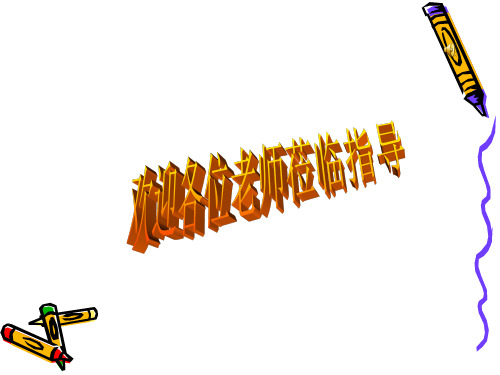
(A )4. _____, is there a library near here? _____, I don’t know. • A. Excuse me; I’m sorry B. I’m sorry Excuse me • C. Excuse me; Excuse me • D. Sorry; sorry • ( )5. The park is 200 kilometers ____here. B • A. far B. away from • C. far away D. away
1
A: Excuse me, _______ ______ where is Zhongshan First Park? C: You need to ___________a take bus. ________, you should take Bus No. 309 and then change to the No. 300 bus at Heping Bridge. It will take _____ you there. A: How far is it from here? C: It’s about ten kilometers away _____ from here.
词典,工具书翻译1A。(组长检查) 2,快速浏览1A,感知对话内容,后划出 表示问路和指路的句型。(学生口头展 示)
答案展示 读一读!3mins
Excuse me , could you tell me the way to Dinghao Building? Excuse me , where is Beitai Road? Go along this road until you get to Beisihuan Road. Turn left and walk on. You will see it on your left. You can’t miss it . It’s about 15 kilometers away from here . First, you need to take Bus No.718. Then you should change to the No.108 bus at Liyuan Stop. It will take you here.
仁爱版七下Unit 6 Topic 3 How can I get to the library Section B 教案
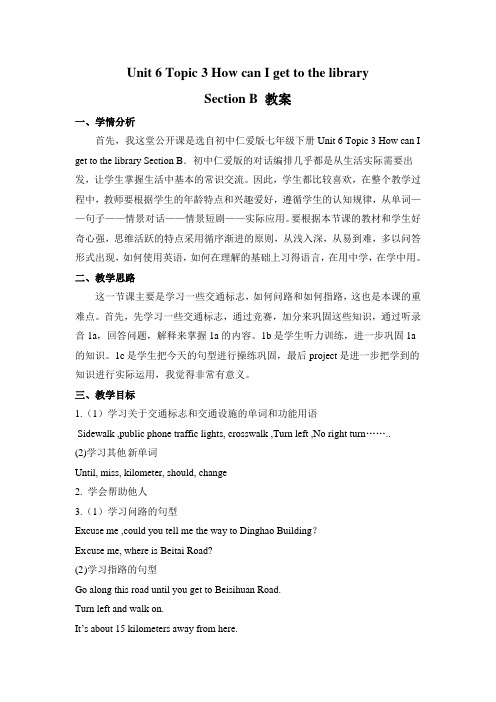
Unit 6 Topic 3 How can I get to the librarySection B 教案一、学情分析首先,我这堂公开课是选自初中仁爱版七年级下册Unit 6 Topic 3 How can I get to the library Section B.初中仁爱版的对话编排几乎都是从生活实际需要出发,让学生掌握生活中基本的常识交流。
因此,学生都比较喜欢,在整个教学过程中,教师要根据学生的年龄特点和兴趣爱好,遵循学生的认知规律,从单词——句子——情景对话——情景短剧——实际应用。
要根据本节课的教材和学生好奇心强,思维活跃的特点采用循序渐进的原则,从浅入深,从易到难,多以问答形式出现,如何使用英语,如何在理解的基础上习得语言,在用中学,在学中用。
二、教学思路这一节课主要是学习一些交通标志,如何问路和如何指路,这也是本课的重难点。
首先,先学习一些交通标志,通过竞赛,加分来巩固这些知识,通过听录音1a,回答问题,解释来掌握1a的内容。
1b是学生听力训练,进一步巩固1a 的知识。
1c是学生把今天的句型进行操练巩固,最后project是进一步把学到的知识进行实际运用,我觉得非常有意义。
三、教学目标1.(1)学习关于交通标志和交通设施的单词和功能用语Sidewalk ,public phone traffic lights, crosswalk ,Turn left ,No right turn……..(2)学习其他新单词Until, miss, kilometer, should, change2. 学会帮助他人3.(1)学习问路的句型Excuse me ,could you tell me the way to Dinghao Building?Excuse me, where is Beitai Road?(2)学习指路的句型Go along this road until you get to Beisihuan Road.Turn left and walk on.It’s about 15 kilometers away from here.First, you need to take bus No.718, then you should change to the No .108 busat Anzhen Bridge.四、教学流程Step 1 Organization of classStep 2 Warming up. (Watch a video, dance together)T: Boys and girls, are you ready? Ss: YesT: Ok, girls, please come here. Let’s dance together.Boys, please clap your desks.Step 3 Duty reportAsk one student to come here and make the duty report. Then answer some questions. Step4. Revision1. Revise some phrases. e.g. 穿过桥,在街道拐角处.2. Ask the way, make some dialogues.T: I’m standing at A. I want to go to the post office, how can I get there?S: Go along this road…..3. Revise five ways of asking the way.Step5. New wordsLearn the new words, read after the teacher.Step6. Presentation1. Learn the traffic signs.Show some traffic signs. Ask: What’s the meaning?Help the Ss say. Turn left, Turn right, No left turn, No right turn. Parking, No parking, crosswalk, danger。
仁爱英语七年级Unit 6 Topic 3 知识点,语法,写作背默(背诵版)

专题6.2.Unit6 Topic3知识点,语法,写作背默祈使句表示请求、命令、禁止、劝告或建议的句子,特点是省略了主语。
祈使句无主语, 主语you常省去; 动词原形谓语当, 句首加don't否定变;●肯定结构:1. Do型(即:动词原形(+宾语)+其它成分)。
如:Please have a seat here. 请这边坐。
有的祈使句在意思明确的情况下,动词可省略。
如:This way, please. = Go this way, please. 请这边走。
2. Be型(即:Be + 表语(名词或形容词)+其它成分) 如:Be a good boy! 要做一个好孩子!3. Let型(即:Let + 宾语+ 动词原形+ 其它成分) 如:Let me help you. 让我来帮你。
●否定结构:1. Do型和Be型的否定式都是在句首加don't构成。
如:Don't forget me! 不要忘记我!Don't be late for school! 上学不要迟到!2. Let型的否定式有两种:“Don't + let + 宾语+ 动词原形+ 其它成分”“Let + 宾语+ not + 动词原形+ 其它成分如:Don't let him go. / Let him not go. 别让他走。
3. 有些可用no开头,用来表示禁止性的祈使句。
如:No smoking! 禁止吸烟!No fishing! 禁止钓鱼!问路1问路用语:Is there a … near here?How can I get to …?Where is …?Which is the way to …?Could you (please)tell me the way to …?Do you know the way to …?2.指路用语:Go up/along…street (to the end ).Turn right/left at the +序数词+(street )Go across the bridge=cross the bridgeIt’s about+数词+meters/kilometers along on the right/leftGo along this road until you get to +地点Walk on 继续走You’ll see it on your right /left. You can’t miss it.You need to take bus No.1 then you should change to the No. busIt’s about +数词+meters/kilometers away from here.练习1. me, is there a bank here?打扰了,请问这附近有银行吗?Yes. up Xinhua Street to the , and you'll find it on your .是的.沿着新华街直走到终点,左边就是银行。
仁爱版英语教材8年级下册Unit6Topic3SectionB

1.Write a passage according to the accident report form on page 46. 2.Preview(预习) the new words and passage in Section C.
1.If you ride at night , 2.If you ride yourmotobicycle on the street, 3.If you drive a car in Britain, 4.If you drive too fast, 5.If everyone obeys the traffic rules,
看图,用“if”连词成句
1. break the rules, get a fine If we break the rules, we will get a fine. 2. cross the road, be in danger If we cross the road, we will be in danger. 3. make a wrong turn, cause trouble
If you make a wrong turn, you will cause trouble. 4. not drive carefully, get hurt If you don’t drive carefully, you will get hurt.
ⅠChoice. B 1-It is ___for us to follow the traffic rules. -Yes, we must obey them. A impossible B necessary C interesting D dangerous 2 Gao Di is so _____that he often makes mistakes in his C exam. A care B careful C careless D carefully 3 I’m ___ trouble . Could you do me a favor? C A on B with C in D for 4 If Tom___, I ___swimming alone. A A doesn’t come; will go B won’t come ;will go C will come; won’t go D is coming; don’t go
仁爱版英语八年级下册Unit6 Topic3 教材知识详解
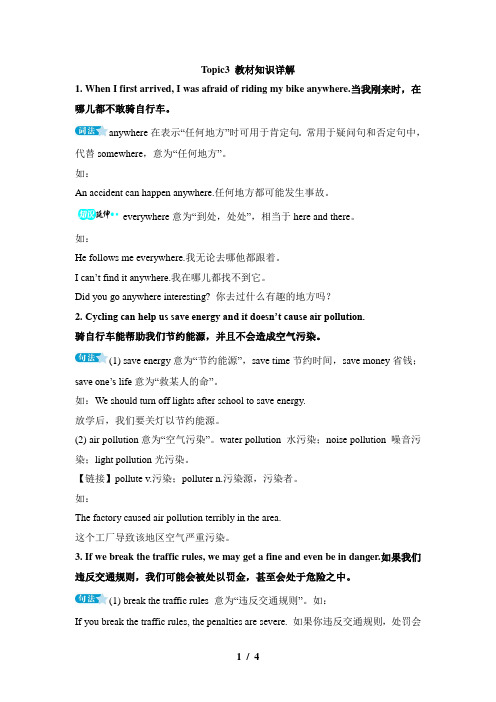
Topic3 教材知识详解1. When I first arrived, I was afraid of riding my bike anywhere.当我刚来时,在哪儿都不敢骑自行车。
anywhere在表示“任何地方”时可用于肯定句。
常用于疑问句和否定句中,代替somewhere,意为“任何地方”。
如:An accident can happen anywhere.任何地方都可能发生事故。
everywhere意为“到处,处处”,相当于here and there。
如:He follows me everywhere.我无论去哪他都跟着。
I can’t find it anywhere.我在哪儿都找不到它。
Did you go anywhere interesting? 你去过什么有趣的地方吗?2.Cycling can help us save energy and it doesn’t cause air pollution.骑自行车能帮助我们节约能源,并且不会造成空气污染。
(1) save energy意为“节约能源”,save time节约时间,save money省钱;save one’s life意为“救某人的命”。
如:We should turn off lights after school to save energy.放学后,我们要关灯以节约能源。
(2) air pollution意为“空气污染”。
water pollution 水污染;noise pollution 噪音污染;light pollution光污染。
【链接】pollute v.污染;polluter n.污染源,污染者。
如:The factory caused air pollution terribly in the area.这个工厂导致该地区空气严重污染。
3. If we break the traffic rules, we may get a fine and even be in danger.如果我们违反交通规则,我们可能会被处以罚金,甚至会处于危险之中。
仁爱英语九年级下册Unit6-知识点

Unit 6 Topic 1 Section A1. It’s + adj. + (for sb.) to do sth. 对某人来说做……是……的。
e.g. It’s difficult for us to learn English well. 对我们来说学好英语很难。
2. in one’s spare time = in one’s free time 在某人的空余时间e.g. In my spare time, I often watch TV.3. prefer v.更喜欢prefer sth. 更喜欢……prefer to do sth. 更喜欢做……prefer A to B 喜欢A胜过B(A、B指的是物)prefer doing sth. to doing sth. 喜欢做……胜过做……e.g. I prefer staying at home to shopping. 我喜欢待在家胜过购物。
e.g. I prefer to sing folk songs. 我喜欢唱民歌。
4. would rather do than do s 相当于would do rather than do,比起做……更愿意做……e.g. I would rather read books than play basketball.比起打篮球,我更愿意看书。
当than前后的动作一致时,为避免重复,后者可省略。
e.g. I would rather play football than basketball.Unit 6 Topic 1 Section B1. be interested in 对……感兴趣2. be based on…根据……;取材于……;以……为基础e.g. The book is based on teaching book. 那本书是根据教材改编的。
The report is based on his recent research.这份报告是以他最近的研究为基础的。
仁爱英语八下Unit6Topic3重点句子

U6T3重点句子Section A1.I think traffic in Beijing is very crazy.我认为北京的交通非常拥挤。
2.You’ll get used to it soon.你很快就会习惯的。
3.When I first arrived, I was afraid of riding my bike anywhere.But now I feel a little more confident.我刚来这里的时候,到任何地方都不敢骑自行车,但是现在感觉有点自信了。
4.If people obey the traffic rules,there will be fewer accidents.如果人们遵守交通规则,交通事故就会减少。
5.Cycling can help us save energy and it doesn’t cause air pollution.骑自行车有助于我们节约能源而且不会造成空气污染。
6.It’s easy to park bikes,too.而且骑自行车也很容易。
7.I agree with you./I disagree with you.我同意你的观点/我不同意你的观点。
8.When the driver came out to have a look,he found the rider was badly hurt.当司机下车看时,他发现骑车人严重受伤。
9.As soon as the driver saw what happened,he called 120 at once.当司机看到发生的事故,他就立刻拨打了120.Section B1.We should wear bicycle helmets when riding.骑自行车时我们应该戴头盔。
2.If we ride at night,we should have lights on the bicycle or wearlight-colored clothes.如果在晚上骑车,我们就应该在自行车上安装车灯或穿浅色的衣服。
仁爱英语七年级下册Unit6Topic3HowcanIgettothelibrary?SectionC教案
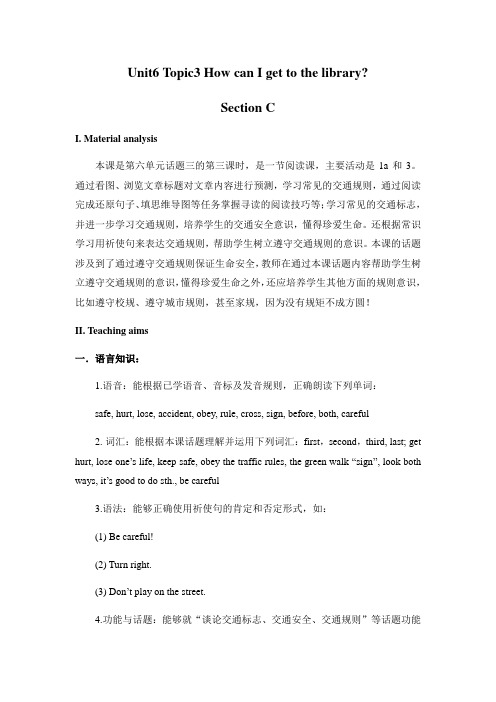
Unit6 Topic3 How can I get to the library?Section CI. Material analysis本课是第六单元话题三的第三课时,是一节阅读课,主要活动是1a和3。
通过看图、浏览文章标题对文章内容进行预测,学习常见的交通规则,通过阅读完成还原句子、填思维导图等任务掌握寻读的阅读技巧等;学习常见的交通标志,并进一步学习交通规则,培养学生的交通安全意识,懂得珍爱生命。
还根据常识学习用祈使句来表达交通规则,帮助学生树立遵守交通规则的意识。
本课的话题涉及到了通过遵守交通规则保证生命安全,教师在通过本课话题内容帮助学生树立遵守交通规则的意识,懂得珍爱生命之外,还应培养学生其他方面的规则意识,比如遵守校规、遵守城市规则,甚至家规,因为没有规矩不成方圆!II. Teaching aims一.语言知识:1.语音:能根据已学语音、音标及发音规则,正确朗读下列单词:safe, hurt, lose, accident, obey, rule, cross, sign, before, both, careful2.词汇:能根据本课话题理解并运用下列词汇:first,second,third, last; get hurt, lose one’s life, keep safe, obey the traffic rules, the green walk “sign”, look both ways, it’s good to do sth., be careful3.语法:能够正确使用祈使句的肯定和否定形式,如:(1) Be careful!(2) Turn right.(3) Don’t play on the street.4.功能与话题:能够就“谈论交通标志、交通安全、交通规则”等话题功能进行交流与对话操练,如:(1) First, we must obey the traffic rules.(2) Second, before we cross the street, we must stop and look both ways …(3) Third, we must never play on the street.(4) Last, it’s good to help children and old people cross the street.(5) Stop when the light is red.(6) We must obey the traffic rules....二、语言技能:1.能听懂与本节课话题有关的语段,能听懂老师的课堂指令并做出适当的反应;2.能用英文简单地提出忠告和建议;能够就“谈论交通标志、交通安全、交通规则”等话题功能进行交流与对话操练,如:(1) First, we must obey the traffic rules.(2) Second, before we cross the street, we must stop and look both ways …(3) Third, we must never play on the street.(4) Last, it’s good to help children and old people cross the street.(5) Stop when the light is red.(6) We must obey the traffic rules....并能够从“谈论遵守交通规则”延伸到谈论遵守校规、城市规则等,如:(1)Listen careful in class.(2)Keep quiet in class.(3)Don’t talk in class.(4)Don’t speak loudly in public....3.能读懂简单的表达交通标志和交通规则的词句并能正确地朗读课文。
七年级英语下册Unit6Topic3HowcanIgettothelibrary讲解与

Unit 6 Topic 3 How can I get to the library讲解与练习Section A:1.问路用语:Is there a … near here? How can I get to …?Where is …?Which is theway to …?Could you (please)tell me the way to …?Do you know the way to …?指路用语:Go up/along…street (to the end ).Turn right/left at the +序数词+(street )Go across the bridge=cross the bridgeIt's about+数词+meters/kilometers along on the right/leftGo along this road until you get to +地点 Walk on 继续走You'll see it on your right /left. You can't miss it.You need to take bus No. then you should change to the No. busat +地点 It will take you there.It's about +数词+meters/kilometers away from here.2.get to +地点到达某地 4.Thank you all the same.仍然感谢3.across from 在…对面 on the corner of 在…和…拐角处Exercises:1. Is there a bank here? Go this street the end ,and you'll findyour left.2.How can I (到达)the bookstore.3. Go along Xinhua Street and turn left the first street.4. Go the bridge.(cross).5. The bookstore is the school.(在…对面)Section B:1.need to do sth. 需要做某事.2.乘…路公交车 take bus No. /take the No.3.How far 对距离提问 How long 对长度提问或对时间段提问 how old对年龄提问 Howoften 对频率提问Exercises:1.If you get up late ,you'll (错过)the early bus.2.I'll stay at home (一直到…) the rain stops.3.Nothing can (改变)Mr. Wang's idea.4.Our school is (两千米远)my home.5. Chang the No.300 bus LiuLi Bridge.6. It's about ten kilometers away from here.(对划线部分提问)Section C:1.get hurt 受伤 in the traffic accidents/an accident obey the rulers2.both :两者都… all 三者或三者以上都…3.way: n.①方向②道路 on the way to4. help sb. (to) do sth.5. on the street be late for 迟到5.It is +形容词+(for sb.)+to do sth.(对某人来说)做某事…样6.help ①名词 with the help of …在…的帮助下②动词 help sb. with sth. =helpsb. (to) do sth. Help oneself (to sth.)自助,自用(食物)等7.a ticket for speeding/drinking/parking in the wrong place/making a wrong turn18. wait for sb.等待某人 wait for one's turn 等着轮到某人Exercises:1.Every year many people (受伤)or (死亡) traffic accident.2.We must (遵守交通规则)3. In China, traffic keeps the rightthe road.4. It is good (help) children and old people (cross) the road .5.We must never play (在街道上) 8. Don't school. (迟到)6. (等着轮到你)when the lights are red.7. (保持安静)in class .Section D:1.call from a public phone 从公共电话处打电话2. at the traffic lights3.at the foot of 在…的脚下4.do some shopping=go shoppingExercises:A) 1. I'm (call) from a public phone the corner Zhichun Road andQiuzhi Street.2. Turn left the traffic lights.3. December is the t month of theyear.4. Maria can't r a boat. she is afraid of water.5. The children are c Children's Day in the school.6. Mary's father wants to buy a birthday cake and some c for her.7. The s of the box is rectangle.8. December is the t month of a year.9. Can you c from one to hundred, Jane?10. Students must be s in class, when the teacher is having class.11.S is the first day of the week. 12. We enjoy r on the lake on weekends.13. The boy f down from the bike and hurt himself.14. I feel so tired, because I often stay up until m these days.15. — What's two p seven? --It's nine.16. We are going to h a birthday party for her. 17. Children's Day is inJ .B)根据汉语意思填空.1.Can you (解答)the math problems, Polly ?2.I'm (恐怕)you can't.3.Tt's your (顺序)to sing song.4.At Kangkang's birthday party, Jane (玩得很很高兴)5. Look, your face is dirty. Go and wash it (立刻)6.Can you (照相)?7. (轮流)in playing the guitar.8.Everyone had (玩得愉快)at the party.9. (怎么样) Kangkang's birthday party?10.Don't play (电子游戏)on Sunday.11.I can perform ballet (也).12.Lucy go to bed (直到…才)Lily came back home.13.Tomorrow is February the (八日).14.We had a (令人惊喜的)party.C)单项选择.2( ) 1. Linda, please these flowers the classroom.A. bring, inB. take, inC. take, to( ) 2. What about there by bus, Tom? A. to go B. going C. goYou like music very much. Did you sing a song at the party? ---No, but —( ) 3.A. didB. doC. didn't Helen .any words. the blackboard, but I can't ( ) 4. I'mA. looking, seeB. looking at, seeC. seeing, look at( ) 5.She is going to buy a present her mother. A. to B. of C. forog and two hens in the picture. A. be B. is C. are ( ) 6. There a fr( ) 7. Please stop and have a rest, you be very thirsty.A. willB. mustC. shouldhospital yesterday. A. / B. a C. the ( ) 8. He was ill in( ) 9. February is from other members. It has 28 days or 29.A. differentB. sameC. funny( ) 10. Maria sang a song English the party.A. in, atB. in, inC. with, in( ) 11.Kangkang the candles out in one breath.A. blowsB. blowedC. blew--OK, . — Hurry up (赶快)!It's time to leave. ( )12. A . I'm coming.B.I came.C. I will come.( ) 13. -- What was the date yesterday? -- .A. It was June 2nd.B. It's May 8th, 1995.C. It was Sunday.photos C. photoes party.A. photoB. at will take of you the ( ) 14. I( ) 15. Michael America on a cold spring morning.A. leaveB. leavesC. left.句型转换D)) 改为否定句1. Jane came to school late yesterday morning. (Jane to school late yesterday morning.) 2. The recorder is 5 centimeters wide. (对划线部分提问Is the recorder?) 3. My brother can ride a motorbike. (改为一般疑问句 Brother a motorbike?? 4. What's the matter? (同义句转换) What's) 同义句转换4.He enjoyed himself at party.(He at the party.5. 1. Look! Jane (fly) a kite.2. I (find) many people in the room when I came in.3. He (go) to school at7:20 every day.4. Jane (play) the guitar for her friends last night.(dance) at Kangkang's party?5. -- Helen--Yes, she did. She (dance) very well.320XX—019学年度第一学期生物教研组工作计划指导思想以新一轮课程改革为抓手,更新教育理念,积极推进教学改革。
仁爱英语八年级下册Unit6topic3重点知识点总结及练习
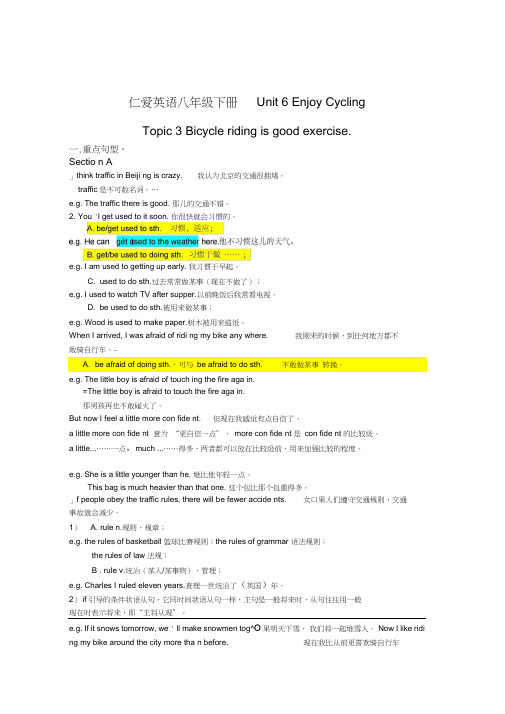
仁爱英语八年级下册Unit 6 Enjoy CyclingTopic 3 Bicycle riding is good exercise.一.重点句型。
Sectio n A」think traffic in Beiji ng is crazy. 我认为北京的交通很拥堵。
traffic是不可数名词。
…e.g. The traffic there is good. 那儿的交通不错。
2. You 'l get used to it soon. 你很快就会习惯的。
e.g. I am used to getting up early. 我习惯于早起。
C. used to do sth.过去常常做某事(现在不做了);e.g. I used to watch TV after supper.以前晚饭后我常看电视。
D. be used to do sth.被用来做某事;e.g. Wood is used to make paper.树木被用来造纸。
When I arrived, I was afraid of ridi ng my bike any where. 我刚来的时候,到任何地方都不敢骑自行车。
-A. be afraid of doing sth.,可与be afraid to do sth. 不敢做某事转换。
e.g. The little boy is afraid of touch ing the fire aga in.=The little boy is afraid to touch the fire aga in.那男孩再也不敢碰火了。
But now I feel a little more con fide nt. 但现在我感觉有点自信了。
a little more con fide nt 意为“更自信一点”,more con fide nt 是con fide nt 的比较级。
a little...……一点,much ...……得多,两者都可以放在比较级前,用来加强比较的程度。
仁爱英语 九年级上册Unit 6 Topic 3 课文翻译

Unit 6 Topic 3 课文翻译S ectionA-1aHow time flies! We'll graduate from Beijing International School this weekend!时间过得真快呀!这个星期我们就要从北京国际学校毕业了!Yes, and there's going to be a graduation ceremony.是啊,到时候会有毕业典礼。
What should we do to get ready for it?我们应该做点什么来准备呢?I think we should prepare some gifts.我觉得我们应该准备点礼物。
But, first of all, we must pass our final examination.但是,首先我们得考过期末考试。
Take it easy. We have worked so hard that we will be able to pass it easily.别担心。
我们学习这么认真,很轻松就能过的。
Shall we give speeches at the ceremony?我们能在毕业典礼上讲话吗?Perhaps. If so, what are you going to say?或许吧。
如果能的话,你想说什么?I'll say I have learned not only how to study, but how to be a man.我想说我不仅学到了如何学习,更学到了如何做人。
Thinking back on the past three years, I have learned that if I want to succeed, I must study hard.回想过去的三年,我学到了如果想要成功,就必须努力学习。
Well, I will never forget the saying, "Nothing is impossible if you set your mind to it."嗯,我不会忘记“有志者,事竟成”的。
仁爱英语 九年级上册Unit 6 Topic 3 课文翻译

Unit 6 Topic 3 课文翻译SectionA-1aHow time flies! We'll graduate from Beijing International School this weekend!时间过得真快呀!这个星期我们就要从北京国际学校毕业了!Yes, and there's going to be a graduation ceremony.是啊,到时候会有毕业典礼。
What should we do to get ready for it?我们应该做点什么来准备呢?I think we should prepare some gifts.我觉得我们应该准备点礼物。
But, first of all, we must pass our final examination.但是,首先我们得考过期末考试。
Take it easy. We have worked so hard that we will be able to pass it easily.别担心。
我们学习这么认真,很轻松就能过的。
Shall we give speeches at the ceremony?我们能在毕业典礼上讲话吗?Perhaps. If so, what are you going to say?或许吧。
如果能的话,你想说什么?I'll say I have learned not only how to study, but how to be a man.我想说我不仅学到了如何学习,更学到了如何做人。
Thinking back on the past three years, I have learned that if I want to succeed, I must study hard. 回想过去的三年,我学到了如果想要成功,就必须努力学习。
Well, I will never forget the saying, "Nothing is impossible if you set your mind to it."嗯,我不会忘记“有志者,事竟成”的。
仁爱英语八年级下册Unit 6 Topic 3 Section B

1. Learn some new words and expressions: careless, helmet, light-colored, get a fine, be in danger, make a wrong turn. 2. Learn the usages of adverbial clauses of condition.
make not drive a wrong carefully turn cause get trouble hurt
Let’s help Kangkang and Michael match the two parts of the sentences to make traffic rules. ( ) 1. If you ride at night, A/E ( A ) 2. If you ride on the street, ( D ) 3. If you drive a car in England, (B/F ) 4. If you drive too fast, A. you must be careful. B. you may have an accident. C. the roads will be safer. D. you must drive on the lefthand side of the road. E. you should have lights on the bicycle or wear lightcolored clothes. F. you will get a fine.
There are many advantages of cycling. What are they?
can help us save energy. Advantage 1: Cycling _________________________ It doesn’t cause air pollution. Advantage 2: _________________________ It’s easy to park bikes. Advantage 3:_________________________
- 1、下载文档前请自行甄别文档内容的完整性,平台不提供额外的编辑、内容补充、找答案等附加服务。
- 2、"仅部分预览"的文档,不可在线预览部分如存在完整性等问题,可反馈申请退款(可完整预览的文档不适用该条件!)。
- 3、如文档侵犯您的权益,请联系客服反馈,我们会尽快为您处理(人工客服工作时间:9:00-18:30)。
Unit 6 T o pic 3 Section B
【学习目标】
1、会读、会写下列单词。
chess, thirsty, hungry, memory, in memory of …
2、理解下列句子。
(1) People invented Chinese chess in memory of the famous battle.
(2) Learn the new while reviewing the old.
(3) It marks the beginning of modern Chinese history.
3、会用并列连词“both … and …, neither … nor…”
【预习导学】
1、预习本课对话,回答下列问题。
(1)Do Wang Junfeng and his father like playing Chinese chess?
(2) Does Li Ming’s father like playing Chinese chess?
(3) What about Li Ming’s mother?
2、试着理解下列句子。
(1) People invented Chinese chess in memory of the famous battle.
(2) Learn the new while reviewing the old.
(3) It marks the beginning of modern Chinese history.
【课堂导学】
1、复习上一节课的重点,调查学生对中国象棋的爱好情况,图片导入新课,学习新单词。
2、朗读1 a,理解句意,回答【预习导学】中的问题,并点评。
3、完成1b, 并点评
4、指导学习并列连词“both … and …, neither … nor…”
(1)both … and … 两者都……(谓语动词用复数)
(2)就近原则:
not only … but also … 不但……而且……
neither … nor … 既不……也不……
either … or … 或者……或者……
f.g:. Both A and B like playing Chinese chess.=Not only A but also B likes playing Chinese chess.
Neither A nor B likes playing Chinese chess.
5、完成2、3 理解【预习导学】中的句子,并点评。
6、练习。
Ⅰ.单项选择。
( )1.Cats and tigers are animals of the cat family(猫科动物),so cats ______ tigers in many ways.
A.are similar to
B.are similar from
C.are different from
D.are different to ( )2.Mr. Wang was ______ because he was late for work. He is out of work now.
A.punished
B.dismissed
C.discussed
D.praised
( )3.He works hard at his lessons. I often see him ______ books in his classroom.
A.to read
B.read
C.reading
D.reads
( )4.—Must we go there together at once?
—______ you ______ he goes there, only one student is needed.
A.Both; and
B.Either; or
C.Neither; nor
D.Not only; but al so ( )5.—Will the foreigners have any problems talking with Chinese people in China?
—I don’t think so. Now ______ the young ______ the old are learning to speak English.
A.neither; nor
B.either; or
C.only; except
D.not only; but also
Ⅱ.句型转换。
1.I don’t like rice. Wang Rui doesn’t like it, either.(同义句转换)
_______ I _______ Wang Rui likes rice.
2.Both Jane and Maria draw it well.(同义句转换)
Jane draws it ______ well ______ Maria.
3.The flowers are very beautiful.(改为感叹句)______ ______ flowers!
4.This is a machine. It can tell us time.(改为含定语从句的复合句)
This is a machine ______ ______ tell us time.
5.Cai Lun developed this kind of paper.(改为被动语态)
This kind of paper ______ ______ by Cai Lun.
Ⅲ.完形填空。
Long long ago, man had only the sun and the moon for light. After they learned to 16 fi re, they carried burning sticks to 17 their way. Later they learned to 18 sticks into fat. The burning fat had a bright light and 19 longer. After man learned to use a wick(灯芯), they 20 candles, 21 were improved as time went by. People still use 22 today.
Later man made many kinds of oil lamps. These lamps burned coal oil(煤油) and had glass chimneys(灯罩). Later the gas light which needed 23 wick nor chimneys was developed. All these lights had one thing in common—they had to be lighted 24 a fire.
In 1879, Thomas Edison invented the light bulb. It can be 25 without a fire.
( )1.A.make B.do C.take D.find
( )2.A.do B.have C.make D.light
( )e B.go C.put D.take
( )4.A.stayed B.worked C.made sted
( )5.A.made ed C.invented D.did
( )6.A.what B.who C.which D.why
( )7.A.fire B.sticks C.candles D.fat
( )8.A.neither B.either C.both D.all
( )9.A.as B.like C.with D.without
( )10.A.lighting B.lighted C.lights D.light
【作业布置】
1、复习并熟记本课重点。
2、预习下一课。
【小结与反思】。
